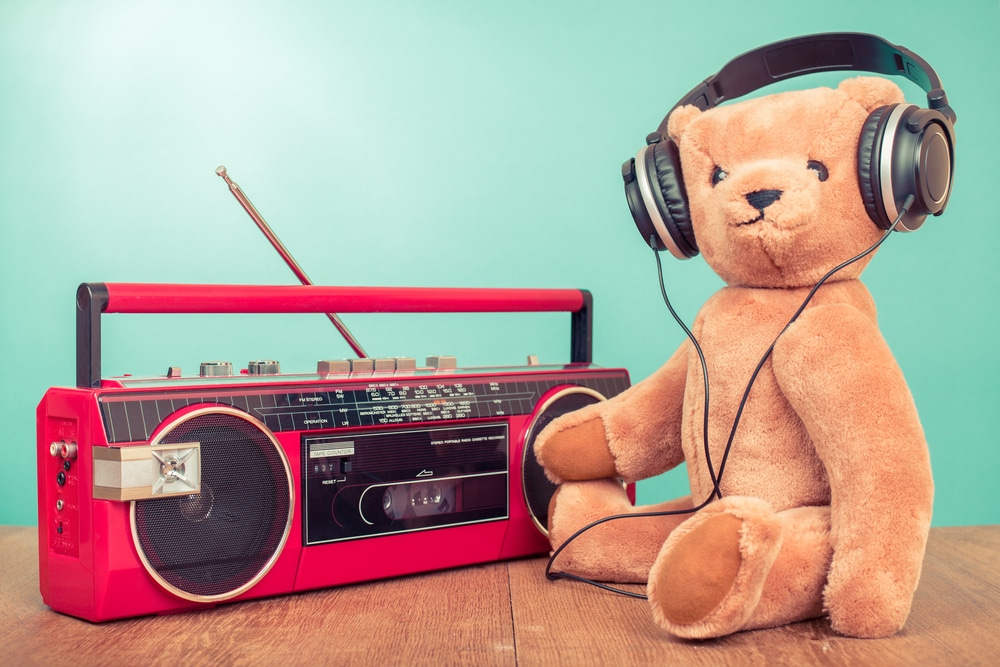
The 13 Best German Radio Stations to Listen and Learn
The vibrant format of radio can be a fantastic tool for improving your German language skills.
Maybe you’re in Germany and able to tune in to terrestrial FM stations.
Or perhaps you’re overseas and looking for the perfect online streams to jump-start your German learning experience while also absorbing music, news and humor.
With all these choices, where do you begin? Here are a few of the best German radio stations to get you started.
Contents
Download: This blog post is available as a convenient and portable PDF that you can take anywhere. Click here to get a copy. (Download)
1. Radio D from Deutsche Welle: Best for Novice German Learners

One such resource for beginners is the free Radio D podcast. Although the podcast hasn’t been updated since 2009, it’s still worth a look as it delivers easily understandable basics and a logical progression of concepts.
Also, it’s fun to listen to, as it centers around Paula and Phillip, who are dedicated to uncovering mysterious events popping up around Germany.
2. Deutschlandfunk: Best for Functioning News Junkies

For example, you can check out Deutschlandfunk, the news-focused subsidiary of Deutschlandradio, which also offers programs with more of a cultural or pedagogic focus. Deutschlandfunk features plenty of cutting-edge reporting on events of international significance, including interviews with leading politicians and other figures in public life. The language will challenge you and the content will reward you.
3. ARD Audiothek: Best for True Blue News Addicts

Plus, if you listen carefully, you’ll hear subtle differences in word choice, accents and other linguistic nuances across regions, so be sure to cycle your playlist between these stations once in a while.
I recommend checking out the online stream of NDR Info, which offers high-quality news production, along with music, weather and more. Never underestimate the value of learning to discuss current and controversial issues like (and with) the pros!
4. Sport1.de: Best for Football Fanatics

Tune in for games from the Bundesliga and 2. Liga (national league and second division league, respectively), as well as international championships, analysis by experts and player interviews.
Keep yourself updated on your favorite Füßballgötter (football gods), hone your knowledge of sports slang and pick up discussion material for chats with fellow fan colleagues or the guys at the local Eckkneipe (corner pub).
5. STAR FM: Best for Rock Rebels
So your first German word was E-Gitarre (electric guitar) and your number-one reason for visiting Deutschland is seeing Die Toten Hosen or Die Ärzte live in concert? Rock on! But in the meantime, STAR FM has got your musical needs covered.
Their online site has multiple streams. Choose between maximum rock, rock classics, alternative, from hell (heavy rock) and blues. If you happen to be in Berlin, check out one of their regular parties at Watergate’s less famous neighbor, Magnet Club.
6. True HipHop FM: Best for Rap Fans
Don’t have much time for rock shows because you’re too busy attending the latest underground hip-hop event in your city and working on your mixtape?
Or maybe you aren’t all that passionate about rap music, but you’re a savvy language student and realize that if you can learn to understand verses spit at this speed—whether slurred street slang or complex political ideology—you can reach new frontiers on the road to fluency.
Rap radio can help you there, so try tuning in to the online station TrueHipHop for ’round-the-clock German language beats.
7. FluxFM: Best for Indie Lovers
Want to fine-tune your German while catching some cutting-edge alternative jams? FluxFM is a good place to start and is equally suited for office productivity and weekend party playlists.
They specialize in alt-rock and electro-pop, with more English-language artists than German, but the DJ talk segments are in German and feature short bits of current events and the latest from the local music scenes. They have online streams from both the Berlin and Bremen markets.
The Berlin station also organizes regular parties at the Spreeside FluxBau. And who knows, that hipster cutie at the bar could be just the person to lend regular Sprachpartner (language partner) meetings an extra bit of incentive. This is the perfect station to listen to while leafing through a German youth culture magazine.
8. Radio SAW: Best for Pop Melophiles

Above and beyond the music, if you like talk radio and morning show formats, these guys can help keep you idly entertained while improving your German comprehension. This station also has plenty of live studio concerts, interviews with artists and current news bites.
9. Klassik Radio: Best for Classical Connoisseurs

You don’t have to be a classical music expert to appreciate its beauty or ability to improve your focus when you’re studying. Give yourself a dose of high culture with a station like Klassik Radio. Their programming is syndicated across Germany and also includes late-night offerings branching out into jazz, ambient and world music.
10. rbbKultur: Best for Culture Vultures

Even if you aren’t a fan of powdered wigs and ridiculously uncomfortable dresses, this station gives you a lot of Hochdeutsch (“High German” – the standard language you’ll be taught in class). After all, it’s this form of the language which you will be tested on in class, so even if you know your way around a regional dialect, it’s still important to be on top of your proper German.
11. hr3: Best for Comedy Lovers

Going against the age-old stereotype that Germans don’t have a sense of humor, this quirky radio station dedicates its broadcasting to comedy shows. Their varied schedule often includes music review shows.
You can check out the station’s playlist on their website to see if their tunes are to your taste—like their Die hr3 Morning Family series.
12. Radio.de: Best for the Adventurous Listener

Through Radio.de, you can explore new radio stations by type of music, tags, user favorites or recommendations. If that sounds like too much effort, Radio.de also has a top 10 for you to browse. Streams can be started directly from their site.
For those who want to stream the latest on Austria, there’s also Radio.at. It has the same format as Radio.de—except you’ll have the bonus of learning more about Arnold Schwarzenegger’s home country!
13. TuneIn: Best for People Who Like to Listen to Everything

TuneIn offers a number of live streams from different German radio stations. The platform not only lets you browse channels by city and shows the programming of every station but also continues to play the last started live stream while you go hunting around for more.
Plus, select radio stations have previously aired shows available as recordings for you to listen to over and over again.
The span of German radio offerings is truly staggering, so start with these stations first.
Whether you’re listening to music, comedy, sports or talk shows, German radio is an awesome tool for German language learning.
Download: This blog post is available as a convenient and portable PDF that you can take anywhere. Click here to get a copy. (Download)





